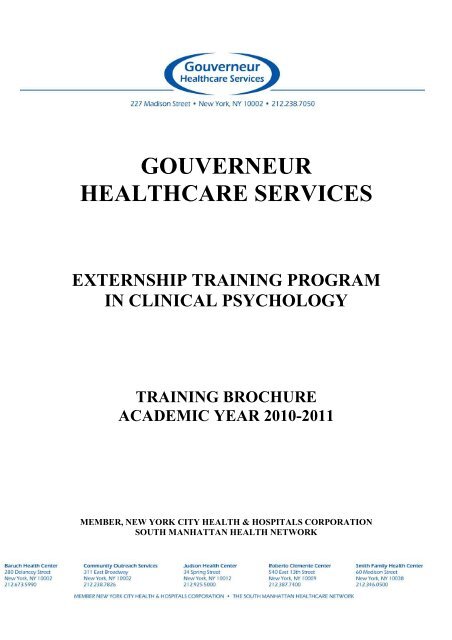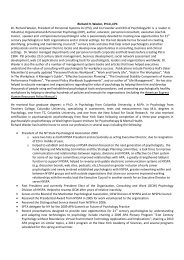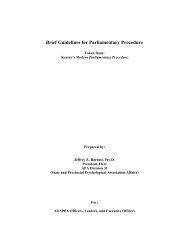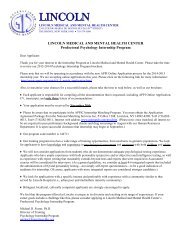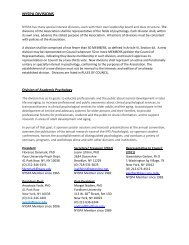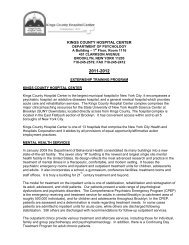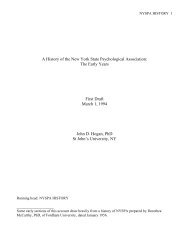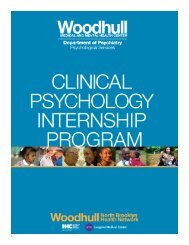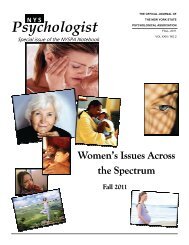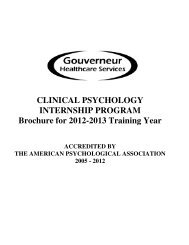gouverneur healthcare services - New York State Psychological ...
gouverneur healthcare services - New York State Psychological ...
gouverneur healthcare services - New York State Psychological ...
You also want an ePaper? Increase the reach of your titles
YUMPU automatically turns print PDFs into web optimized ePapers that Google loves.
GOUVERNEUR<br />
HEALTHCARE SERVICES<br />
EXTERNSHIP TRAINING PROGRAM<br />
IN CLINICAL PSYCHOLOGY<br />
TRAINING BROCHURE<br />
ACADEMIC YEAR 2010-2011<br />
MEMBER, NEW YORK CITY HEALTH & HOSPITALS CORPORATION<br />
SOUTH MANHATTAN HEALTH NETWORK
GOVERNEUR HEALTHCARE SERVICES<br />
EXTERNSHIP TRAINING PROGRAM IN CLINICAL PSYCHOLOGY<br />
Gouverneur Healthcare Services, in professional affiliation with the <strong>New</strong> <strong>York</strong> University<br />
School of Medicine (NYUSOM) and Bellevue Hospital Center (BHC), provides a major portion<br />
of the outpatient mental health <strong>services</strong> for the Lower Manhattan (LM) catchment area of <strong>New</strong><br />
<strong>York</strong> City. The LM catchment area is characterized by a broad diversity of ethnic, linguistic and<br />
racial groups. It includes large numbers of non-English speaking immigrants of Hispanic,<br />
Chinese, Italian and Jewish backgrounds. The broad diversity of our patient population<br />
challenges our Department of Behavioral Health (BH) to provide much needed mental health<br />
<strong>services</strong> in a culturally relevant and sensitive fashion. The stresses of acculturation, poverty and<br />
discrimination place our patient population at high risk for physical illness and psychological<br />
disturbance. Further, the LM catchment area has been officially designated as a poverty area by<br />
the Office of Economic Opportunity, and has the second highest incidence of state<br />
hospitalizations in <strong>New</strong> <strong>York</strong> City. Despite the influx of new immigrant groups, as well as<br />
efforts towards gentrification, there is a sense of stability to the area, which attracts a familyoriented<br />
population who use the <strong>services</strong> of the hospital for its many health care needs.<br />
The Department of Behavioral Health (BH) has seen a significant expansion of its clinical<br />
programs beginning in the early 1980s. With a tradition of outreach and mobile crisis<br />
intervention to the Lower East Side community, the Department has expanded the crisis outreach<br />
team model of intervention. It includes the development of teams to meet the needs of specific<br />
patient populations, such as the young adult chronic patient, the psychologically impaired<br />
homeless, and the isolated impaired elderly. Additionally, the Department of BH has<br />
implemented a unique program geared to meeting the mental health needs of the Asian<br />
community. This program, the Asian Bicultural Clinic (ABC), brings together several clinical<br />
components to provide culturally sensitive and competent care through multidisciplinary<br />
bilingual and bicultural staff.<br />
In addition to implementing innovative clinical <strong>services</strong>, the psychology staff is encouraged to<br />
pursue their own training as mental health professionals and to actively participate in the clinical<br />
training of all disciplines. Ongoing training is offered to psychology interns, psychology externs,<br />
social work interns and nurse practitioner students, both through (i) didactic seminars on a range<br />
of clinical topics, (ii) monthly grand rounds, during which both in-house staff and experts in<br />
clinical areas from the general professional community are invited to present on various relevant<br />
clinical topics, and (iii) twice monthly departmental case conferences, during which staff<br />
psychologists, social workers and trainees, as well as psychiatrists, present particularly<br />
challenging cases for discussion and recommendations for treatment going forward.<br />
The Psychology Service functions within the Department of BH at Gouverneur. The staff, at<br />
present, is comprised of 13 full-time and 2 part-time psychologists. Specialties of the staff<br />
include psychodynamic psychotherapy, interpersonal psychoanalysis, Dialectical Behavioral<br />
therapy, stress and pain management, hypnosis, focusing oriented psychotherapy, cognitivebehavioral<br />
therapy, child / adolescent psychotherapy, family therapy, group therapy, integrated<br />
psychotherapy, crisis intervention, treatment of trauma, psychological, psycho-educational, and<br />
neuropsychological testing and assessment, and dementia screenings.<br />
Psychologists are assigned to many of the units within the department, including the Adult<br />
Service, Walk-In Clinic, Child and Adolescent Service (C&A), Young Adult Outreach Team
(YAOT), Women’s Comprehensive Health Program (WP), Center for Older Adults and their<br />
Familieis (CFOA), Asian Bicultural Clinic (ABC), and World Trade Center Mental Health Clinic<br />
(WTC). Staff members perform a variety of functions, including intakes / screenings, crisis<br />
intervention, psychotherapy, psychological testing / psychodiagnostic evaluations,<br />
neuropsychological assessment, teaching seminars, providing supervision and consultation. A<br />
primary component of the Psychology Service is the clinical training of future professionals,<br />
which includes our APA-accredited Clinical Psychology Internship Training Program, which is<br />
committed to training clinical psychology interns as part of the requirements for their doctoral<br />
degrees, and the Externship training program in clinical psychology for doctoral level candidates.<br />
EXTERNSHIP MISSION STATEMENT<br />
The Gouverneur Externship Training Program in Clinical Psychology offers psychology externs<br />
an intensive and wide-ranging clinical and educational experience firmly rooted in multicultural
values and community service. The primary emphasis of the academic yearlong externship<br />
program is the continued professional development of the psychology extern and solid<br />
preparation for future intensive training, i.e. pre-doctoral internship, and eventual transition from<br />
advanced student to beginning professional.<br />
TRAINING PROGRAM AND TRAINING GOALS<br />
Under close supervision and support, psychology externs may gain clinical experience with a<br />
variety of psychotherapy modalities / approaches (individual, group, family, and couples),<br />
psychological and neuropsychological testing / assessments, while serving a population that<br />
encompasses a broad variety of ages, cultures, illnesses, and levels of functioning. It is important<br />
to note that the externship training staff encourages externs to communicate and pursue their<br />
clinical interests as available in the department.<br />
Further, a key educational component of the training program is the exposure to, as well the<br />
necessity of, working as part of a multidisciplinary team. This approach is vital not only to the<br />
comprehensive care of our patients, but also to the education of the trainee. By the end of the<br />
training year, externs would have acquired / further honed the skills, knowledge and flexibility to<br />
confront – proficiently, ethically and creatively – the challenges of working in an urban<br />
outpatient community mental health clinic and treating patients who present with emotional<br />
concerns that are multi-determined and compounded by various medical, cognitive,<br />
socioeconomic, and social / familial struggles.<br />
TRAINING OPPORTUNITIES<br />
Depending on trainees’ particularly clinical interests and training needs, externs may receive<br />
psychological or neuropsychological testing assignments, through which they will refine their<br />
respective skills in clinical observation, interviewing, cognitive testing, personality / emotional<br />
functioning assessment (objective and projective). Further, the dynamics of the testing patients’<br />
problems are explored and integrated in the context of familial, cultural and political factors.<br />
Externs may be assigned testing cases from any of the clinic units, and may have opportunities to<br />
evaluate children, adolescents, adults and older adults. Often, referral questions for assessment<br />
are wide-ranging and complex, including evaluation of a range of neuropsychological problems,<br />
learning disabilities and ADHD, developmental, psycho-diagnostic and psycho-educational<br />
evaluations.<br />
Regarding psychotherapy, externs may be assigned to work with child, adolescent, adult and<br />
geriatric outpatients who present with wide-ranging emotional concerns. Opportunities for<br />
individual, group, family and couples therapy may be available. Externs are encouraged to<br />
express their training needs and interests, as well to communicate any particular projects they<br />
would like to undertake, for example, forming a new group to address a specific problem area /<br />
concern (e.g. relaxation skills group for patients with panic disorder).<br />
Externs participate in weekly, face-to-face individual supervision with their assigned primary<br />
supervisor. Externs’ primary supervisors work closely with each extern to develop and monitor<br />
training goals. Additional supervision, including consultation on particular cases, may be<br />
arranged, as needed, and on a case-by-case basis.<br />
Externs have opportunities, and are strongly encouraged, to present individual cases in monthly
departmental case conferences where they can receive wide-ranging clinical feedback from the<br />
multidisciplinary staff in the Department of BH.<br />
DESCRIPTION OF SERVICES<br />
The Adult Service provides assessment and treatment to both English-speaking and<br />
monolingual Spanish-speaking patients, age 18 and older. The Adult Service includes the Walkin<br />
Clinic, which performs intakes / screenings of patients seeking admission into the clinic, crisis<br />
intervention and emergency consultation to various primary care and specialty clinics within the<br />
hospital. Services in the Adult Service include comprehensive biopsychosocial assessment,
psychiatric evaluation, psychological / neuropsychological testing, individual, group, couple and<br />
family therapy, and crisis intervention <strong>services</strong>. The staff includes psychologists, psychiatrists,<br />
social workers, and nurse practitioners.<br />
The Child and Adolescent Service (C&A) provides a full range of outpatient psychological<br />
<strong>services</strong> and care to children ages 4-18, and their families. The treatment population includes<br />
children and adolescents with diverse emotional and behavioral problems. The <strong>services</strong> offered<br />
include comprehensive psychiatric, developmental and psycho-educational evaluations, as well<br />
as various treatment approaches / modalities, including individual, group and family therapy,<br />
including play therapy. The service is staffed with psychologists, psychiatrists, and social<br />
workers, including child protection specialists.<br />
The Young Adult Outreach Team (YAOT) assists individuals, ages 18-35, in transition from<br />
psychiatric hospitalization to stabilization in the community. Patients often have a history of<br />
multiple psychiatric hospitalizations with little or no community support system available to<br />
them. The interdisciplinary team provides assessment and treatment to individuals referred from<br />
community agencies and hospital settings, as well from primary care clinics within the hospital.<br />
Individual and group psychotherapy are major <strong>services</strong> offered through this clinic.<br />
The Center for Older Adults and their Families (CFOA) provides ongoing treatment for<br />
adults aged 55 years and older, as well as their families, in coping with the problems and<br />
challenges of later life by empowering them to problem solve in a manner that is efficient and in<br />
unison with the cultural background and values of the identified patients and their respective<br />
families. The CFOA consists of a multiethnic treatment team of clinicians who provide <strong>services</strong><br />
in English, Spanish, and Chinese, and includes a Continuing Day Treatment Program (CDTP), as<br />
well as an outpatient clinic which provides individual, group and family psychotherapy,<br />
recreation and activity therapies, crisis intervention, nutritional counseling and coordination of<br />
medical care. <strong>Psychological</strong> assessment focusing on older adult issues, including dementia<br />
screenings, is also available.<br />
The Women’s Comprehensive Health Program addresses the unique needs of culturally and<br />
linguistically diverse women who are experiencing chronic mental illness and concomitant<br />
medical, substance abuse, social, occupational and housing issues. A multidisciplinary team of<br />
clinicians provides holistic woman-centered and family-oriented care, employing traditional and<br />
alternative therapeutic approaches within a psycho-educational small and large group format.<br />
The program also employs a coordination of care approach, utilizing community resource<br />
speakers and encourages empowerment activities.<br />
The Asian Bicultural Clinic (ABC) is staffed by bilingual-bicultural Chinese interdisciplinary<br />
treatment team, which includes psychologists, social workers and psychiatrist. The staff is<br />
proficient in three Chinese dialects, which include Mandarin, Cantonese, and Toisanese, and are<br />
skilled in providing culturally competent treatment. ABC offers a full-range of psychotherapy<br />
modalities, psychopharmacology, and case management <strong>services</strong> to Chinese-American children,<br />
adolescents and adults. The staff works closely with Gouverneur’s ambulatory care medical<br />
team, Bellevue Asian inpatient unit, and other community agencies to provide comprehensive<br />
and holistic <strong>healthcare</strong>.
Dialectical Behavioral Therapy (DBT) is a comprehensive treatment program -which follows<br />
the treatment model developed by Marsha Linehan, PhD, to address the complex treatment needs<br />
of patients with chronic difficulties with affective regulation, anger management, self-harm/selfinjurious<br />
behaviors, chaotic interpersonal relationships, and unstable identity/self-esteem<br />
concerns. A key component of DBT is a weekly DBT skills training group, as well as intensive<br />
individual psychotherapy, and psychopharmacology. Further, consistent with the emotional rigor<br />
of this type of clinical work, the DBT program includes a weekly consultation team meeting with<br />
fellow therapists who treat patients in the DBT program.<br />
The Mobile Crisis Unit (MCU) is a psychiatric crisis intervention team involved with outreach<br />
to individuals and families within the Gouverneur catchment area. An interdisciplinary team,<br />
consisting of a psychologist and social workers, provide on-site evaluation that examines a crisis<br />
situation from different points of view. Team members visit patients and families in their homes<br />
during time of extreme stress and assist in the negotiation of <strong>services</strong> with hospitals and other<br />
agencies. These <strong>services</strong> may include the facilitation of patient transfers to area psychiatric<br />
emergency rooms for emergency evaluation and possible hospitalization, or connection /<br />
reconnection with outpatient psychiatric <strong>services</strong>.<br />
Turning Points is a school-based mental health program serving four middle schools housed in<br />
the Corlears Complex building on the Lower East Side of Manhattan. In existence since 1992, it<br />
is staffed by two Behavioral Health staff members who provide individual and group<br />
psychotherapy to non-special education students, consultation to school staff, primary prevention<br />
through classroom workshops on social and life skill development, parent outreach, and linkage<br />
to Gouverneur’s Child and Adolescent Behavioral Health Department.<br />
Parent Infant Program offers a unique multiple-family group therapeutic experience for both<br />
expecting parents and parents of children who are preschool-aged and younger, who are<br />
experiencing the stress of mental illness and emotional instability. The program’s goal is to<br />
foster healthy parent / child interactions, to stabilize a parents’ emotional disorder and behavioral<br />
symptoms that interfere with healthy childcare, and to stimulate the emotional and cognitive<br />
development of the at risk child through the preschool years.<br />
FACILITIES<br />
Gouverneur Healthcare Services is a comprehensive medical-ambulatory care facility, which is<br />
part of <strong>New</strong> <strong>York</strong> City’s municipal hospital system, known as the Health and Hospital’s<br />
Corporation (HHC). It is fully accredited by the <strong>New</strong> <strong>York</strong> <strong>State</strong> Office of Mental Health, and is<br />
an affiliate of <strong>New</strong> <strong>York</strong> University Medical Center. Externs may have access to video recording<br />
equipment and to one-way mirror rooms for assessment and treatment. All externs will have<br />
access to computers; all clinical documentation is computerized / paperless and maintained on<br />
the Quadramed system. Gouverneur’s relative small size, in comparison to other city hospitals,<br />
facilitates close professional contact with pediatricians, internists, and other primary and<br />
specialty care providers / physicians, while simultaneously providing a full range of <strong>services</strong>
typical of larger settings.<br />
ELIGIBILITY<br />
Priority is given to applicants from APA-accredited programs in clinical psychology. However,<br />
applications from school, counseling and combined clinical programs may be considered as well.<br />
Prior to beginning the externship, all applicants must have completed three (3) years of graduate<br />
training, including theory courses and previous practica in both psychological testing and<br />
psychotherapy. Further, applicants must be students in good standing within their respective<br />
graduate psychology programs, as demonstrated by a letter from their respective academic<br />
training directors attesting to such.<br />
RECRUITMENT<br />
As the non-English speaking population in the Lower East Side community steadily increases,<br />
there is also a growing demand at Gouverneur for bilingual service providers who are proficient<br />
in Spanish and Chinese dialects (Mandarin, Cantonese, Fuzhounese). In order to address this<br />
changing need, the psychology externship program is taking efforts to recruit bilingual trainees.<br />
However, ultimately, our commitment is to recruit the best candidates for the externship program<br />
who meet the eligibility criteria set forth above, and who stand to benefit professionally from the<br />
training we offer.<br />
TIME COMMITMENT<br />
The externship is a part-time, 10-month training commitment. Externs are expected to be on-site<br />
16 hours per week, distributed over 2 full weekdays, beginning in early September (after Labor<br />
Day) and ending in late June. Further, we understand that some externs may be applying for<br />
internship at the time of their externship training at Gouverneur, and, with prior notification, will<br />
receive time off for interviewing. Externs are expected to be on-site on Mondays, with the<br />
other day flexible. The mandatory Monday is so that externs can participate in various<br />
interdisciplinary / departmental meetings / seminars, as well be present for a biweekly meeting<br />
with the externship director; on alternating weeks, this biweekly meeting will be administrative<br />
in nature for a discussion of general training and professional development issues / maintenance<br />
of training standards, with the other week reserved for group supervision in a case conference<br />
format.<br />
BENEFITS<br />
Externs receive 11 regular federal / public holidays (including July 4th, Thanksgiving,<br />
Christmas, and <strong>New</strong> Year’s Days), and unpaid sick leave. Any other requested time off is to be<br />
pre-arranged / pre-approved by both the director of externship training and externs’ primary<br />
supervisors. HHC are equal opportunity employers.<br />
APPLICATION PROCEDURES<br />
To apply for an externship position, please send (i) a cover letter detailing your clinical interests<br />
/ experience, goals for the externship year, and mutual fit between your goals / interests /<br />
experience and offerings of the training program, (ii) updated curriculum vitae, (iii) graduate
transcript (unofficial is fine), and (iv) three letters of recommendation, at least one of which<br />
must be from an individual clinical supervisor closely familiar with one’s clinical skills, level of<br />
maturity and personal qualities. Please note, the above application materials must all be sent in<br />
ONE envelope, and addressed to:<br />
Helen Fronshtein, Psy.D.<br />
Director, Externship Training Program in Clinical Psychology<br />
Department of Behavioral Health<br />
Gouverneur Healthcare Services<br />
227 Madison Street<br />
3 rd Floor, Rm #313<br />
<strong>New</strong> <strong>York</strong>, NY 10002<br />
Gouverneur accepts and abides by the externship application guidelines established by the<br />
Psychology Training Directors of <strong>New</strong> <strong>York</strong> <strong>State</strong> (PSYDNYS). Accordingly, Gouverneur will<br />
not accept any applications postmarked prior to January 15, 2010, and all applications<br />
must be received by February 1, 2010. No exceptions to the above deadline will be made, so<br />
please plan accordingly to ensure timely receipt. Interviews are scheduled during the month of<br />
February; externship placement decisions will be made on a rolling basis to be completed by<br />
March 1, 2010.<br />
Should you have any questions about the above application procedures, or the externship<br />
program, in general, please feel free to contact Dr. Helen Fronshtein by phone at 212-238-7554,<br />
or by email at helen.fronshtein@nychhc.org<br />
DIRECTIONS TO GOUVERNEUR<br />
Via NYC subway. Take the Downtown / Brooklyn-bound “F” train. Exit at the “East<br />
Broadway” station (N.B. – NOT “Broadway & Lafayette”). Exit the subway station at the<br />
“Madison Street” side (you will see signs for this). Once above ground, you will be on Madison<br />
Street; however, you will need to turn around walk in the opposite direction. Gouverneur is the<br />
tall brick building on your left, just 1.5 blocks from the subway exit. Please be aware that the<br />
hospital is currently under construction; for this reason, the hospital entrance is<br />
temporarily situated on the Clinton Street side of the building. To access the Clinton Street<br />
entrance, simply continue walking on Madison Street until you reach the corner of Clinton<br />
Street, turn left, and continue halfway down the block. The entrance will be on your left.<br />
Via NYC bus. Take the Downtown M15 / South Ferry bound bus (or the M15 Limited), which
travels southbound along Second Avenue on the east side. Exit the bus on Madison Street (which<br />
will place you on the corner of Pike and Madison Streets). Turn to face eastward (a public school<br />
will be on your far left corner) and walk along Madison Street until you reach Clinton Street.<br />
Turn left on Clinton and continue halfway down the block. The entrance will be on your left.<br />
Via Taxi. Take the FDR Drive South to the “South Street” Exit. Shortly after exiting the drive,<br />
make a right turn on Clinton Street and continue several blocks to Madison Street. Gouverneur is<br />
the tall brick building on the far-left corner of Madison and Clinton Streets. Please be sure to<br />
clarify that you are traveling to “Madison Street” on the Lower East Side, and NOT “Madison<br />
Avenue.”<br />
Please note that driving to the hospital is NOT recommended, as parking in the area is<br />
limited.<br />
PSYCHOLOGY SERVICE STAFF/ TRAINING FACULTY<br />
Director of Psychology<br />
Charles Fernandez Herr, Ph.D., 1992. Clinical Psychology. Columbia University. <strong>New</strong> <strong>York</strong> <strong>State</strong><br />
License. Graduate, William Alanson White Institute of Psychiatry, Psychoanalysis and Psychology.<br />
Certified Focusing Oriented Psychotherapist.<br />
Special Interests: Severe psychopathology, dissociative disorders and reactions to traumatic experiences,<br />
interpersonal psychoanalysis, psychodynamic psychotherapy with adults and children, brief dynamic<br />
therapy, focusing oriented therapy, mindfulness and stress management, impact of society on<br />
psychological development and mental health, anger management, barriers to empathic connection (nonviolent<br />
communication techniques), and dialectical behavioral therapy (DBT).<br />
Wendy Barron, Ph.D., 1996. Clinical Psychology. The <strong>New</strong> School for Social Research. <strong>New</strong> <strong>York</strong><br />
<strong>State</strong> License. Psychologist, Level II. Adult Service.<br />
Special Interests: Chronic pain and stress management, hypnosis, psychotherapy with medically ill
patients, adults, elderly and survivors of trauma, group psychotherapy, cross-cultural psychotherapy.<br />
William Bracero, Ph.D., 1990. Clinical Psychology. <strong>New</strong> <strong>York</strong> University. <strong>New</strong> <strong>York</strong> <strong>State</strong> License.<br />
Psychologist, Level III. Director, Internship Training in Clinical Psychology. Adult Service.<br />
Special Interests: Constructivist-narrative cognitive behavioral therapy, Sampson-Weiss control-mastery<br />
theory, marianismo y machismo, psychotherapy and religion, Santeria y espiritismo, bilingual / bicultural<br />
assessment (TEMAS), DSM-IV culture-bound syndromes, dichos and cuento therapy, Asian and<br />
Hispanic issues in psychotherapy, psychodynamic group psychotherapy.<br />
Diana Chen, Ph.D., 1992. Clinical/School Psychology. Adelphi University. <strong>New</strong> <strong>York</strong> <strong>State</strong> License.<br />
Psychologist, Level III. Director, Asian Bicultural Clinic.<br />
Special Interests: Community Psychology, Integrative therapy, short-tem intensive psychotherapy,<br />
bereavement therapy, PTSD, hypnosis, cross-cultural issues in assessment and psychotherapy,<br />
mindfulness-based treatment of depression, and Dialectical Behavioral Therapy.<br />
George Collins, Ph.D., 2004. Clinical Psychology. Adelphi University. <strong>New</strong> <strong>York</strong> <strong>State</strong> License.<br />
Psychologist, Level II. Young Adult Outreach Team.<br />
Special Interests: Brief psychodynamic psychotherapy, psychotherapy integration, solution-focused<br />
therapy, religious and spiritual issues in psychotherapy, anger management, and hypnosis.<br />
Helen Fronshtein, Psy.D., 2008. Clinical Psychology. Illinois School of Professional Psychology at<br />
Argosy University, Chicago. <strong>New</strong> <strong>York</strong> <strong>State</strong> License. Psychologist, Level II. Director, Externship<br />
Training in Clinical Psychology; Coordinator, Adult Walk-In Clinic.<br />
Special Interests: Psychodynamic psychotherapy, psychodynamic case formulation, crisis intervention,<br />
consultation, projective personality assessment /Rorschach, assessment and treatment of trauma, domestic<br />
violence, immigration and acculturation process, psychotherapy with monolingual Russian speakers.<br />
Cindy Ho, Psy.D., 2008. Clinical Psychology. Chicago School of Professional Psychology. <strong>New</strong> <strong>York</strong><br />
<strong>State</strong> License. Psychologist, Level I. Asian Bicultural Clinic.<br />
Special Interests: Cross-cultural psychology, cognitive-behavioral case formulation and psychotherapy,<br />
dialectical behavior therapy, immigration and acculturation process, severe mental illness, personality<br />
disorders, psychotherapy and assessment with forensic populations, psychological assessment.<br />
Louisa Lam, Ph.D., 2003. Counseling Psychology. Seton Hall University. Psychologist, Level I. Adult<br />
Service, Smoking Cessation Program, Women’s Comprehensive Program, & Mental Health Clinic of the<br />
World Trade Center Environmental Health Center.<br />
Special Interests: Dual diagnosis, severe pathology, cross-cultural psychology, survivors of trauma, group<br />
psychotherapy, neuropsychological assessments.<br />
Lina Leung, Psy.D., 2009. Clinical Psychology. Illinois School of Professional Psychology at Argosy<br />
University, Chicago. Psychologist, Level I. Geriatric Continuing Day Treatment Program & Center for<br />
Older Adults and their Families.<br />
Special Interests: trauma, multicultural psychology, women’s issues, immigration and acculturation<br />
process, severe mental illness/ pathology, psychological testing with ethnic population.<br />
Monica Medina, Psy.D., 2008. Clinical Psychology. Long Island University – C.W. Post Campus.<br />
Psychologist, Level I. Coordinator, Mobile Crisis Unit & City Wide Assistance Team.<br />
Special Interests: Integrative therapy (English/Spanish), severe & persistent mental illness, developmental<br />
disabilities, and crisis intervention with various populations.
Jennifer Press, LCSW, 1996. Social Work. Fordham University. <strong>New</strong> <strong>York</strong> <strong>State</strong> License. Social<br />
Worker, Level IV. Certificate in Family Therapy, Ackerman Institute for Family Therapy, 2005. Adult<br />
Service. Coordinator and Clinical Supervisor, Family Therapy Practicum.<br />
Special Interests: Family and couples therapy.<br />
Julie Reinhold, Psy.D., 1997. School/Clinical Child Psychology. Pace University. <strong>New</strong> <strong>York</strong> <strong>State</strong><br />
License. Psychologist, Level II. Child & Adolescent Service. Coordinator, DBT program.<br />
Special Interests: <strong>Psychological</strong> aspects of religious experience, psychological assessment, learning<br />
disabilities, adolescent development, psychodynamic therapy with children and adults, Dialectical<br />
Behavioral Therapy (DBT) with adolescents and adults.<br />
Sheryl Stasiowski, Ph.D., 2008. Clinical Psychology. Long Island University – Brooklyn Campus.<br />
Psychologist, Level I. Adult Service & Mental Health Clinic of the World Trade Center Environmental<br />
Health Center.<br />
Special Interests: Psychodynamic case formulation and psychotherapy with English and Spanish<br />
Speakers, projective testing, cognitive assessment of persons with developmentally disabilities,<br />
immigration and acculturation with special attention to the Hispanic community, survivors of trauma.<br />
Luis A. Torres, Psy.D., 2008. Clinical Psychology. Illinois School of Professional Psychology at Argosy<br />
University, Chicago. Psychologist, Level I. Adult Service. Coordinator, <strong>Psychological</strong> Testing Service.<br />
Special Interests: Psychodynamic psychotherapy with monolingual and bilingual Spanish speakers,<br />
psychological and neuropsychological assessment with English and Spanish speakers, group therapy<br />
(bereavement, pain management), patients living with HIV/AIDS, dementia screenings, traumatic brain<br />
injury (TBI), EMDR.


